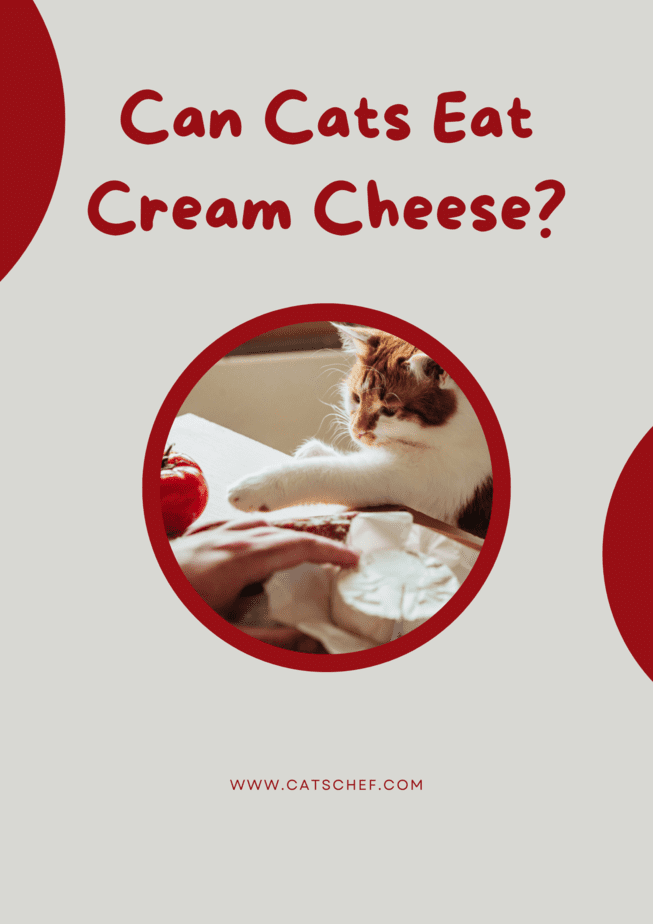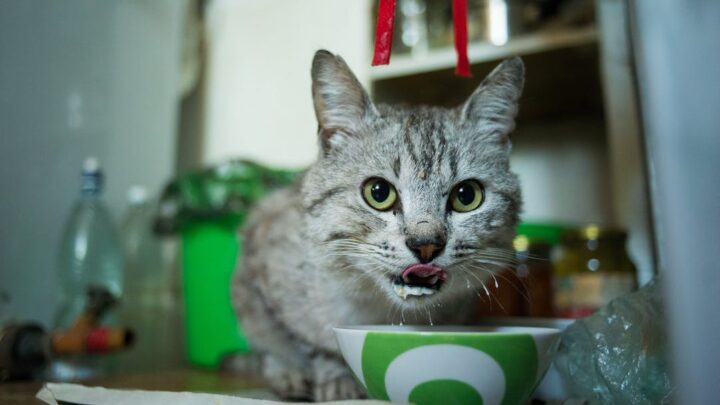What could possibly make you think “Can cats eat cream cheese?” But when I think about it more thoroughly, it’s actually a good one.
If you have a cat, you can always expect her to get in trouble. They will simply sneak their way into your groceries as silently as they slid into your heart.
This sounds cute but is not so fun when you find out the mess she’s made while rummaging through. But, I just know you can’t get mad at her.
You try, but you fall victim to her big, hearty eyes. Still, there’s a much bigger concern than the fact you ended up without your groceries.
One of them is the unanswered question of whether cats can eat cream cheese. At first glance, it doesn’t sound so alarming.
However, your heart rate picks up when you remember that she’s not supposed to consume human foods. Still, what could possibly go wrong?
Cream cheese has a mild, nice flavor and you don’t know of any ingredients that could do harm to your feline. Moreover, you constantly see those cute videos of pets getting into our foods.
Still, with such curious animals, you can never be too much on the lookout. It’s like a 24/7 job for you as their supervisor!
You may feel like this, but then you look back at her and realize that she’s worth it all. Even though she gives you a heart attack from time to time and drives you mad with her crazy antics.
People may not understand you at times, but all you do is want to take the best care of her. This includes pondering over that cream cheese you left on the counter earlier in the day.
Is it possible that a food harmless-looking like this causes you trouble? Can cats eat cream cheese and what are the consequences?
Can cats eat cream cheese?
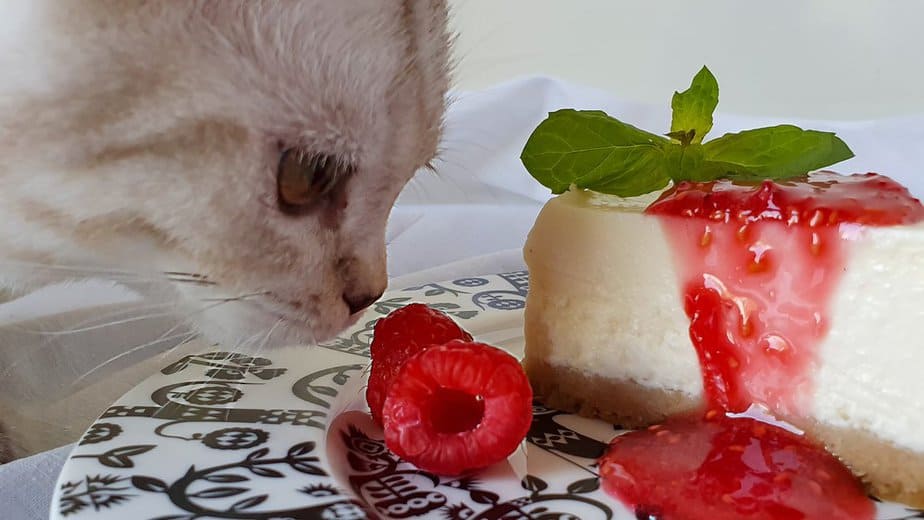
You tried to keep calm but you just couldn’t give yourself a break. I know when you’re fighting the urge but your fingers just can’t keep still.
You typed in the question “Can cats eat cream cheese” and here you are. You hope that your struggles will end here and you stop pulling your hair out.
Well, I’m glad to inform you that you’re right. I’ll help you understand the contents of cream cheese and the impact it has on our furry friends.
The answer to the question “Can cats eat cream cheese” is yes. You’d think it’s that simple, but there’s really more to it.
Unfortunately, there always has to be a BUT. Just when you think you put the full stop to your thinking, here comes that dreadful command and caps lock.
I can imagine your heart rate accelerating while you’re reading these lines with your eyes wide open. However, don’t stress too much.
Some things may frighten you but I’m sure your cat’s totally fine. If she’s only had a lick or two, there’s no reason to worry.
Even if she bad more than that, like a third or a half of the product, keep calm. What you have to look out for are some of the ingredients that could possibly make her sick.
We don’t want that happening, so keep a close eye on any weird or unusual behavior. They’re really good at disguising when something’s hurting them.
Cream cheese isn’t poisonous to felines so you shouldn’t worry about that. However, it contains lactose so she’ll probably be having stomach pains.
What’s the issue with dairy products?

What you should be concerned about when it comes to cream cheese is the dairy content. We love these products, but what about cats?
Well, it’s obvious that she enjoys it as well. However, it doesn’t necessarily have to mean that it’s healthy for her.
You know those foods like gummy bears that we constantly eat even though we know it’s not good for us? Well, cream cheese for cats can be something like gummy bears to us. It serves her as a great treat, but that’s it.
And treats usually aren’t the energy that we crave. I know that’s so sad but we can’t have everything we want. However, your pet doesn’t know this. She’s used to being pampered and getting the best treatment always.
So, it might be hard for her to decipher what’s good for her and what’s not, especially when she smells something attractive like cream cheese.
There’s been a myth going on for centuries that one of the cats’ main choices of food is milk. Well sure, if you give her an offer that good she wouldn’t let it slide.
But, have you ever stopped to think about how could a carnivore that eats meat relish in milk? Well, the answer is simple – the fat.
Dairy products are full of fat and that’s what cats are most attracted to. Therefore don’t be surprised if she tries out her luck on other products such as cottage cheese.
1. Lactose intolerance and milk allergy
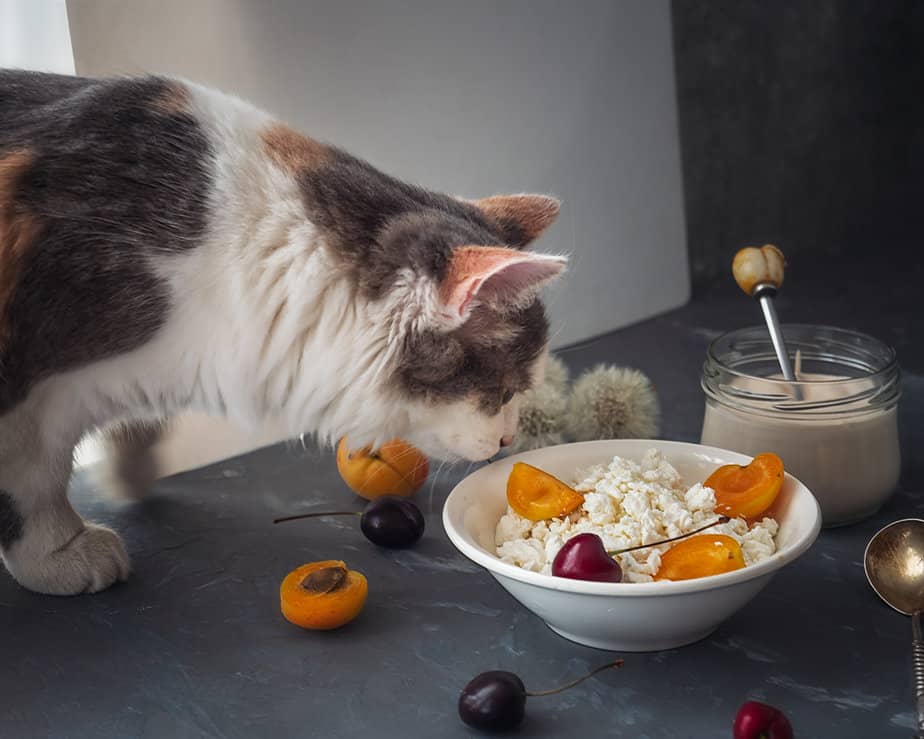
Unfortunately, the stuff you see is only a commercial, or rather a myth. Yes, cats can drink milk and eat other dairy products, but at what cost? Perhaps you didn’t think of this when you asked yourself can cats eat cream cheese. However, it’s still something to be wary of.
Felines are lactose intolerant, believe it or not. So, how are all these commercials showcasing a happy cat licking milk from a food bowl?
Dairy content and lactose have the same effect on them as they do on humans that are lactose intolerant. While cats can eat a bit of cream cheese, give her a whole pack and you’ll see what happens next.
Let me tell you, it won’t be a nice thing to see. Your pet may get the runs and have a hard time keeping food in her stomach. Too much cream cheese can cause nausea as well. If you don’t want your pet bloating up and looming around your house like a balloon, keep the cheese out of her paws.
It’s not life-threatening, but it can cause some real trouble for her. The same goes for milk allergies. Cream cheese is made out of milk, just like any cheese.
The symptoms of lactose intolerance and milk allergies may be similar, but they’re two different things. Just as I previously said, if she’s had some of this treat, monitor her closely.
Any new behavior can be the cause of an alarm because you never know how well your cat can bear new foods. For some pets, it’s a piece of cake, whereas for others it might be a real struggle.
Some of the additional signs of milk allergy are skin rashes, respiratory problems, as well as itching. If you notice these, call your vet’s office.
2. Can cats eat cream cheese because of fat?
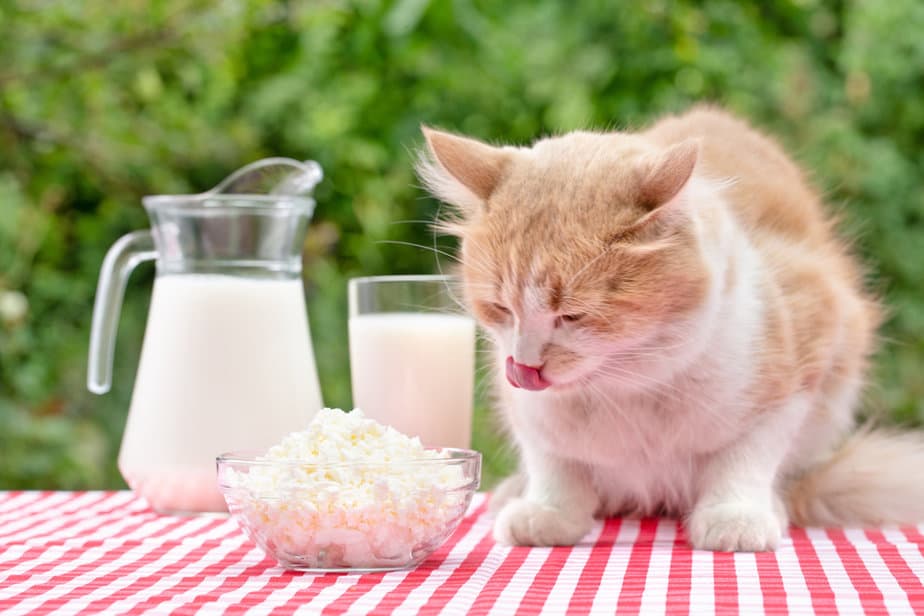
Another concern is the high amount of fat that can be found in these creamy products. It’s something that gives cream cheese its value and texture, but what else?
How can it benefit your pet? Is there something to worry about? These same questions keep replaying in your mind and you just aren’t content enough to carry on as if nothing happened.
You can’t just ignore the fact that there’s half of your cream cheese missing! Now, we’ll forgive her that, but is your cat out of the woods even if she doesn’t show any unusual behavior?
The thing about fat in these store-bought products is that it’s mostly highly saturated fat. We might know of it as unhealthy lipids, but cats don’t.
They just do everything that comes to their mind. While we would perhaps slow down a bit and think of all the additional weight that’s going to stick to us, felines don’t bother with that.
Pretty simple creatures, right? Well, yes. But they’re not aware of how complicating things can turn out sometimes. If you were to ask her, she wouldn’t mind.
Just like any one of us would behave if we had our bellies full of something we set our eyes on. I think it’s mainly the sense of pride and joy they feel when they get away with something.
Either way, too much fat can be damaging if consumed regularly. It’s known to raise blood cholesterol and increase the chances of heart stroke.
Also, fat can lead to blood clot formation, and increase the chances of various heart diseases. When you ask yourself can cats eat cream cheese, just remember this.
3. Say no to the salt content

When you think of cream cheese, salt really doesn’t come to your mind. However, it’s one of those things that act in the long term.
Just like the previously mentioned fat, sodium acts slowly but steadily. It means it won’t harm your pet straight away, but you shouldn’t mess around with it.
High sodium content can make a lot of damage to your feline’s organism. The amount found in a couple of licks and bites isn’t alarming, but you shouldn’t take that for granted.
Speaking long-term, salt intake could seriously make your pet’s health deteriorate. If taken in larger quantities or if it accumulates over time in the body, it might poison her.
This sounds bad and it is bad. It’s one of those things you never wish to happen. Salt toxicity isn’t really common among felines, but it doesn’t mean it’s not happening.
If you’re suspicious that your pet’s taken in a large amount of salt, you should keep a close eye on her behavior. Usually, sodium poisoning might occur within the first few hours.
Some of the clinical signs involve heavy breathing, the feeling of nausea, and an urge to vomit. Over time, it might progress into actual vomiting, as well as diarrhea.
If you’re still unsure if it’s really sodium toxicity, some of the following symptoms may solve the puzzle for you. These include seizures, tremors, as well as coma.
It’s one of the worst fears you can experience as a cat parent. We don’t want that happening, so it’s best to take her to the vet as soon as the first symptoms appear.
